|
| |
THIRD ANNUAL IAAC LITERARY FESTIVAL
NYU KIMMEL CENTER, 60 WASHINGTON SQUARE SOUTH, NYC
|
| OCTOBER 7-9, 2016 |
| |
| Sunday October 9, 2016.
2:30 pm - 3:30 pm |
| |
Session 3B
Poetry |
 |
Phinder Dulai, Neal Hall and H. Masud Taj in conversation with Meena Alexander
|
| Dreams, reality, lives, nature and the cosmic universe move towards a common goal - to nourish the soul, to understand our being. |
| |
| Phinder Dulai |
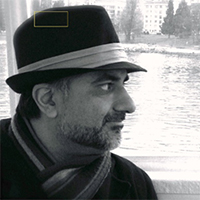 Phinder Dulai’s critically acclaimed poetry collection dream / arteries (Talonbooks) was published in 2014. He is the author of two previous books of poetry: Ragas from the Periphery (Arsenal Pulp Press, 1995) and Basmati Brown (Nightwood Editions, 2000). Dulai lives in Surrey, BC, Canada and comes from a Punjabi background. Dulai has been touring dream / arteries since 2014, and has toured in both Canada and the USA, giving readings at universities, festivals and reading series. He currently works as a consulting editor for Talon Books and Curator of the Floor 9 Arts Salon for the Asia Pacific Foundation of Canada in Vancouver, BC. Dulai was a co-convener on Sound Thinking Symposium 2015 entitled Voicing the City In/verse: Reading Surrey and the Super- Suburb; and has collaborated on a sound installation called The Grove – A Spatial Narrative with artists Carmen Papalia and Andrew Lee for the Surrey Art Gallery. His most recent work has been published in TripWire Journal, Canada and Beyond, Dusie and Canadian Literature and Cue Books Anthology. Dulai is a co-founder of the interdisciplinary contemporary arts group The South of Fraser Inter Arts Collective (SOFIA/c). Recently, Dulai was awarded the Word Masala Award by the Word Masala Non-Profit Foundation in London, England. He will travel to England in 2017 to receive the award. Phinder Dulai’s critically acclaimed poetry collection dream / arteries (Talonbooks) was published in 2014. He is the author of two previous books of poetry: Ragas from the Periphery (Arsenal Pulp Press, 1995) and Basmati Brown (Nightwood Editions, 2000). Dulai lives in Surrey, BC, Canada and comes from a Punjabi background. Dulai has been touring dream / arteries since 2014, and has toured in both Canada and the USA, giving readings at universities, festivals and reading series. He currently works as a consulting editor for Talon Books and Curator of the Floor 9 Arts Salon for the Asia Pacific Foundation of Canada in Vancouver, BC. Dulai was a co-convener on Sound Thinking Symposium 2015 entitled Voicing the City In/verse: Reading Surrey and the Super- Suburb; and has collaborated on a sound installation called The Grove – A Spatial Narrative with artists Carmen Papalia and Andrew Lee for the Surrey Art Gallery. His most recent work has been published in TripWire Journal, Canada and Beyond, Dusie and Canadian Literature and Cue Books Anthology. Dulai is a co-founder of the interdisciplinary contemporary arts group The South of Fraser Inter Arts Collective (SOFIA/c). Recently, Dulai was awarded the Word Masala Award by the Word Masala Non-Profit Foundation in London, England. He will travel to England in 2017 to receive the award.
Phinder Dulai's participation at the Indo-American Arts Council's 3rd Annual Literary Festival has been supported by the Canada Council for the Arts.
 |
| |
| Dreams/arteries |
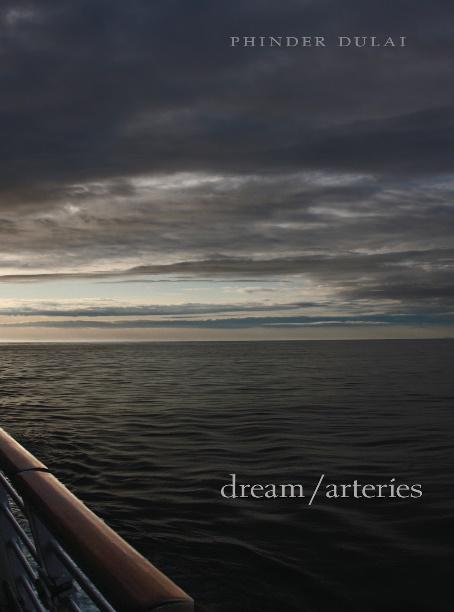 A hundred years ago this year, the Japanese steamship Komagata Maru set sail for Canada with 376 Sikh, Muslim, and Hindu migrants travelling from Punjab, India. They were refused entry at Vancouver, even though all passengers were British subjects. The Komagata Maru sat moored in Vancouver’s harbour for two months while courts decided the passengers’ right to access – and while the city’s white citizens lined the pier taunting those onboard. Eventually, Canada’s racist exclusion laws were upheld and the ship was forced to return to India. A hundred years ago this year, the Japanese steamship Komagata Maru set sail for Canada with 376 Sikh, Muslim, and Hindu migrants travelling from Punjab, India. They were refused entry at Vancouver, even though all passengers were British subjects. The Komagata Maru sat moored in Vancouver’s harbour for two months while courts decided the passengers’ right to access – and while the city’s white citizens lined the pier taunting those onboard. Eventually, Canada’s racist exclusion laws were upheld and the ship was forced to return to India.
In his third poetry collection, dream / arteries, Phinder Dulai connects these 376 passengers with other New World settler migrants who travelled on the same ship throughout its thirty-six-year history, including to ports of call in Hong Kong, Japan, India, Turkey, Halifax, Montreal, and Ellis Island. By drawing on ship records, nautical maps, passenger manifests, and the rich, detailed record of the Komagata Maru, Dulai demonstrates how the 1914 incident encapsulates a broader narrative of migration throughout the New World.
Dulai’s hybrid poetics fuse historical fact with the fictive. He interweaves words of loss and silence with the cacophonous sound bites of TV news culture, war coverage, and the manifestations of contemporary ennui. Framing the “I” in the provisional realm of the observer and “subjectless” space, Dulai draws out the poetic line to explore hope, possibility, and regeneration. |
|
| Neal Hall |
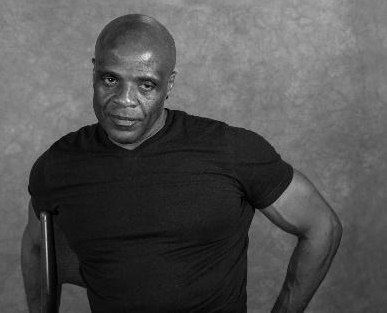 Neal Hall is an ophthalmologist and graduate of Cornell and Harvard Universities. An internationally acclaimed poet, he has performed poetry readings throughout the U.S. and internationally. Neal Hall is an ophthalmologist and graduate of Cornell and Harvard Universities. An internationally acclaimed poet, he has performed poetry readings throughout the U.S. and internationally.
His poetry speaks not just to the surface pain of injustice and inhumanity but deep into that pain, we label and package into genteel socio-political-economic-religious constructs to blur the common lines of cause, that is our shared story.
Dr. Hall is an award-winning author of four books of poetry: Nigger For Life, reflecting his painful discovery, that in “unspoken America," race is the one thing by which he is first judged, first measured and metered diminished value, dignity, equality and justice. Winter’s A’ Coming Still reflecting poignantly the more things are said to change, the more things are made to stay the same. His 3rd book Appalling Silence, selections of his work were translated into Telugu and Urdu and published in India. His 4th book Where Do I Sit. was released Spring 2016. His poetry has been translated into six languages: Telugu, Kannada, Urdu, Bengali, Italian and German. |
| |
| Where Do I Sit |
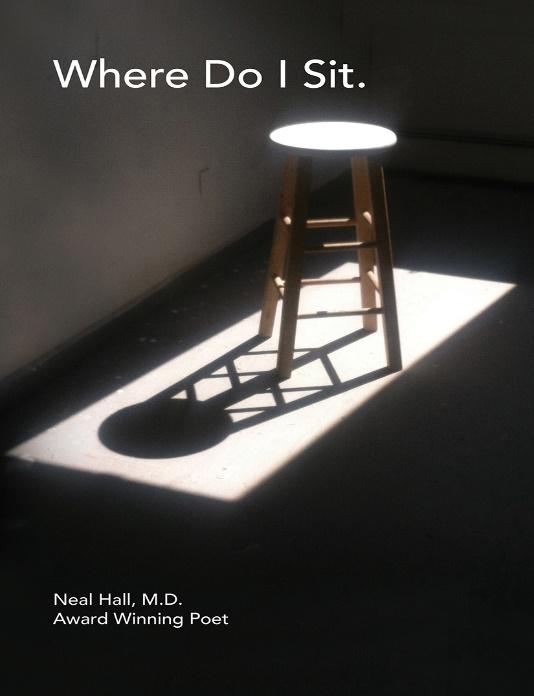 “After Dr. Neal Hall’s first two books of poetry, Nigger For Life, and Winter’s A’ Coming Still, here is another book that displays the skill, breadth, and versatility with which he has honed his craft. Where Do I Sit does not jettison the sharp denunciations of racial and economic injustice that appeared in his first collections. On the contrary, there are poems, such as “In the Wake of Trayvon, What Matters Next,” in which he advances an explanation for contemporary anti-black racism and provides a corresponding call for black economic autonomy - “buy black or buy from that”. Other poems appeal for ethical interventions, such as “Free will is not free” from “Before Me . . . Still”; and drawing from Dr. King “we all suffer greatly at the appalling silence of good people ” addressed in the poem “A Long Walk“. This book provides the reader with broad social analyses and solutions. It is not a lament, but a call for action that intersperses epic representations with deeply lyrical reflections such as in “Hand,” and on love, personal loss, and a range of sentiments. Reading Where Do I Sit, one has the impression that Dr. Hall can turn any sentiment, observation, and object into a reason for poetry.” Dr. Gerard Aching, Director of the Africana Studies and Research Center, Cornell University, “After Dr. Neal Hall’s first two books of poetry, Nigger For Life, and Winter’s A’ Coming Still, here is another book that displays the skill, breadth, and versatility with which he has honed his craft. Where Do I Sit does not jettison the sharp denunciations of racial and economic injustice that appeared in his first collections. On the contrary, there are poems, such as “In the Wake of Trayvon, What Matters Next,” in which he advances an explanation for contemporary anti-black racism and provides a corresponding call for black economic autonomy - “buy black or buy from that”. Other poems appeal for ethical interventions, such as “Free will is not free” from “Before Me . . . Still”; and drawing from Dr. King “we all suffer greatly at the appalling silence of good people ” addressed in the poem “A Long Walk“. This book provides the reader with broad social analyses and solutions. It is not a lament, but a call for action that intersperses epic representations with deeply lyrical reflections such as in “Hand,” and on love, personal loss, and a range of sentiments. Reading Where Do I Sit, one has the impression that Dr. Hall can turn any sentiment, observation, and object into a reason for poetry.” Dr. Gerard Aching, Director of the Africana Studies and Research Center, Cornell University,
“Reading and rereading his poems again gives you a glimpse of the range of betrayal and shock that blackness carries on its back. This is poetry that scalds you into waking up to the possibility that you are perhaps one of those silent spectators. All in all he is a poet. And unquestionably one of the most significant voices of the century.” Vasanth Kannabiran, Writer, Poet, Activist, Chairperson, Culture Asmita Resource Centre for Women, Hyderabad, India. |
|
| H.Masud Taj |
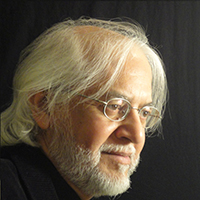 Architect-Poet-Calligrapher H. Masud Taj has recited to audiences ranging from Officers of the Indian Navy to a lone Bosnian refugee in Vienna; in venues such as Stanley Kubrick’s secluded estate in Hertfordshire; Kingdom Café in red-light area of Amsterdam; Hall of Philosophy, Chautauqua, NY; Poetry Place, London; a 400 year old Sufi Lodge, Istanbul; Roman Abbey, St. Albans; and at the International Festival of Authors in Toronto and Ottawa. Alphabestiary is archived in the Special Poetry Collection of Carleton University, where he is award winning Adjunct Professor of architecture. The MacOdrum Library have also archived his calligraphy. Global Affairs, Canada published a tri-lingual calligraphic edition of his long poem, which they permanently installed in the installation he designed for their Canadian Chancery in Bengaluru, India and inducted in the Library of Parliament, Ottawa. He is presently working on his memoir Wandering Poet: How I Went Halfway Round The World To Recite A Poem To A Stranger Who Didn’t Know I Was Coming & Other Recollections Of An Oral Poet. He lives with his family in Canada and spends each monsoon as an architect in India. Architect-Poet-Calligrapher H. Masud Taj has recited to audiences ranging from Officers of the Indian Navy to a lone Bosnian refugee in Vienna; in venues such as Stanley Kubrick’s secluded estate in Hertfordshire; Kingdom Café in red-light area of Amsterdam; Hall of Philosophy, Chautauqua, NY; Poetry Place, London; a 400 year old Sufi Lodge, Istanbul; Roman Abbey, St. Albans; and at the International Festival of Authors in Toronto and Ottawa. Alphabestiary is archived in the Special Poetry Collection of Carleton University, where he is award winning Adjunct Professor of architecture. The MacOdrum Library have also archived his calligraphy. Global Affairs, Canada published a tri-lingual calligraphic edition of his long poem, which they permanently installed in the installation he designed for their Canadian Chancery in Bengaluru, India and inducted in the Library of Parliament, Ottawa. He is presently working on his memoir Wandering Poet: How I Went Halfway Round The World To Recite A Poem To A Stranger Who Didn’t Know I Was Coming & Other Recollections Of An Oral Poet. He lives with his family in Canada and spends each monsoon as an architect in India. |
| |
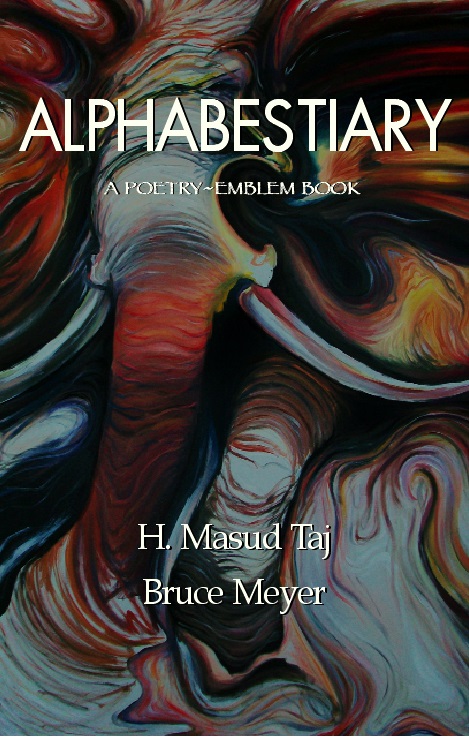 Poems by H Masud Taj and exegesis by Bruce Meyer, Alphabestiary presents a celebration of the international language of fauna - the animals that reside at the core of the imagination. Each letter of the alphabet is linked to a different living thing, allowing these creatures to exist in the fabric of language and providing a categorical list of the beings that travel within thoughts and dreams. This volume allows two very different approaches to literature to converge, creating an experience that is accessible, informative, and entertaining. The book also features six videos/QR downloadable features, offering readings by the authors, an interview with the authors, and other supplemental material to take the reading experience beyond the printed page. Poems by H Masud Taj and exegesis by Bruce Meyer, Alphabestiary presents a celebration of the international language of fauna - the animals that reside at the core of the imagination. Each letter of the alphabet is linked to a different living thing, allowing these creatures to exist in the fabric of language and providing a categorical list of the beings that travel within thoughts and dreams. This volume allows two very different approaches to literature to converge, creating an experience that is accessible, informative, and entertaining. The book also features six videos/QR downloadable features, offering readings by the authors, an interview with the authors, and other supplemental material to take the reading experience beyond the printed page. |
|
| Meena Alexander |
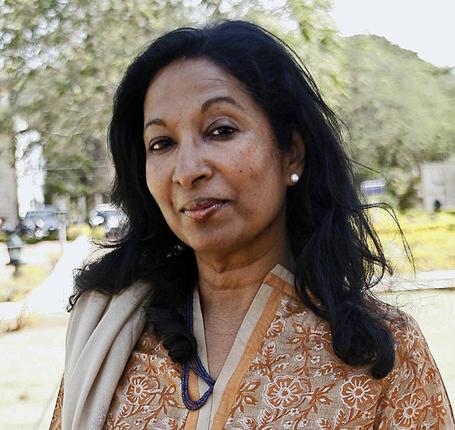 Meena Alexander described in The Statesman (India) as “undoubtedly one of the finest poets in contemporary times” is the author of Atmospheric Embroidery (Hachette India, 2015) Her volumes of poetry include Illiterate Heart (2002) winner of the PEN Open Book Award, Raw Silk (2004) and Birthplace with Buried Stones (2013). She is the editor of Indian Love Poems and author of the critically acclaimed memoir Fault Lines. An anthology she edited Name me a Word: Indian Writers Reflect on Writing is forthcoming from Yale University Press, 2017. She has received awards from the John Simon Guggenheim Foundation, the Fulbright and Rockefeller Foundations and the Arts Council of England. She received the Imbongi Yesizwe International Poetry Award from South Africa and in 2014 she was named National Fellow at the Indian Institute of Advanced Study, Shimla. She is the author of eight books of poetry, two novels and two volumes of essays. In summer 2016 was poet in residence in Venice as part of the 500th anniversary celebrations of the Venetian Ghetto. She is Distinguished Professor of English at the Graduate Center/ Hunter College, CUNY. www.meenaalexander.com Meena Alexander described in The Statesman (India) as “undoubtedly one of the finest poets in contemporary times” is the author of Atmospheric Embroidery (Hachette India, 2015) Her volumes of poetry include Illiterate Heart (2002) winner of the PEN Open Book Award, Raw Silk (2004) and Birthplace with Buried Stones (2013). She is the editor of Indian Love Poems and author of the critically acclaimed memoir Fault Lines. An anthology she edited Name me a Word: Indian Writers Reflect on Writing is forthcoming from Yale University Press, 2017. She has received awards from the John Simon Guggenheim Foundation, the Fulbright and Rockefeller Foundations and the Arts Council of England. She received the Imbongi Yesizwe International Poetry Award from South Africa and in 2014 she was named National Fellow at the Indian Institute of Advanced Study, Shimla. She is the author of eight books of poetry, two novels and two volumes of essays. In summer 2016 was poet in residence in Venice as part of the 500th anniversary celebrations of the Venetian Ghetto. She is Distinguished Professor of English at the Graduate Center/ Hunter College, CUNY. www.meenaalexander.com |
| |
|
|

